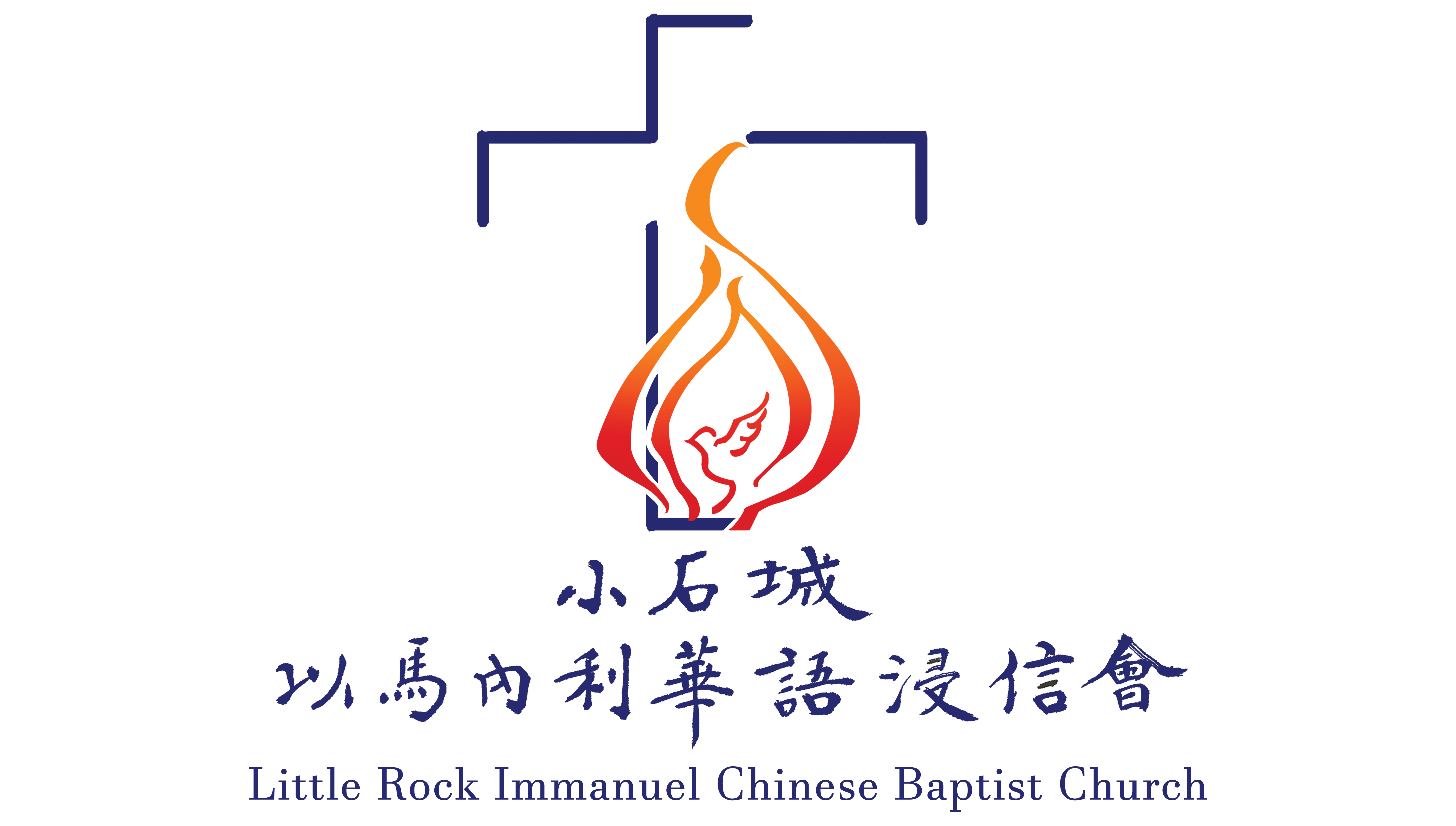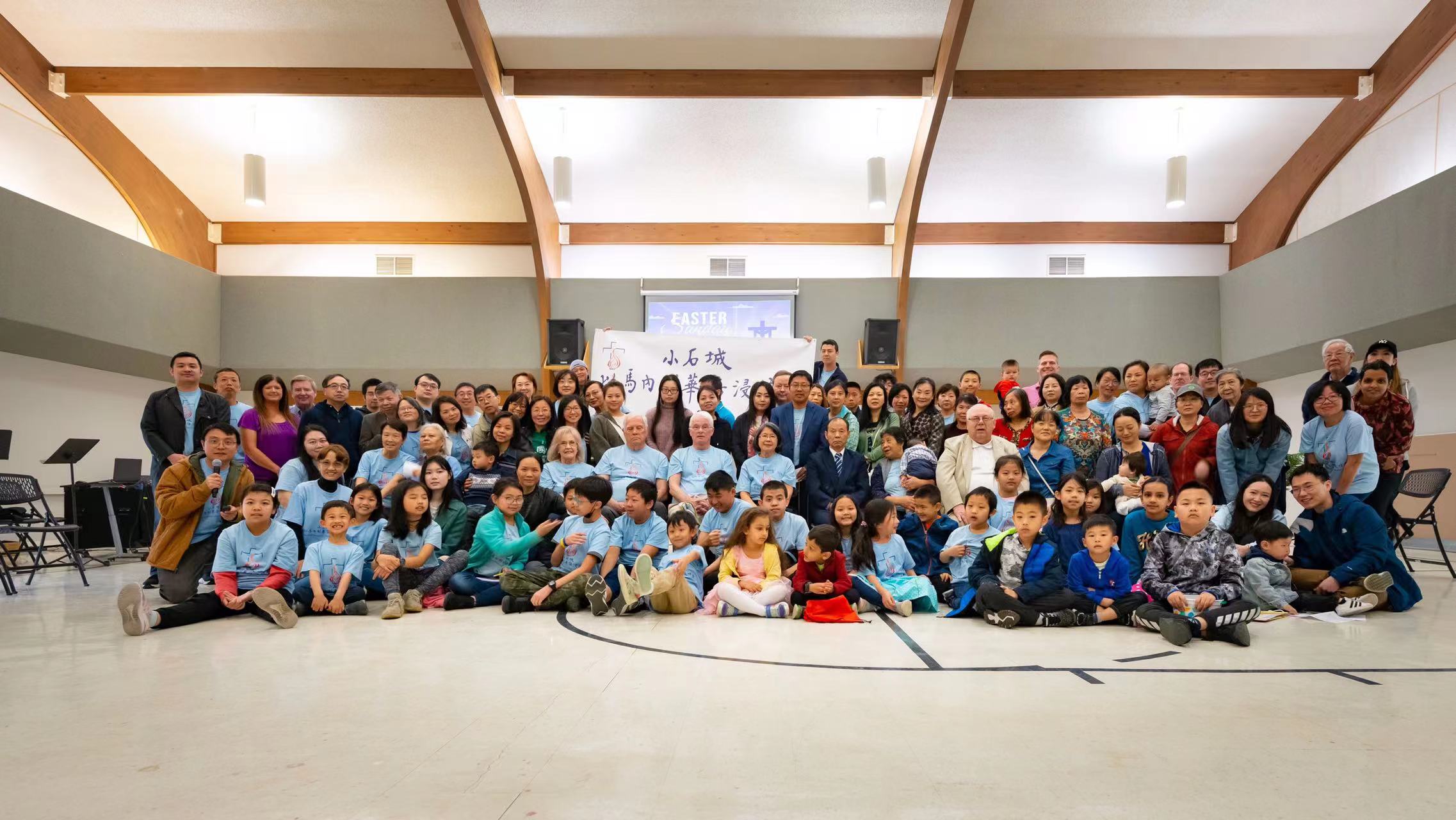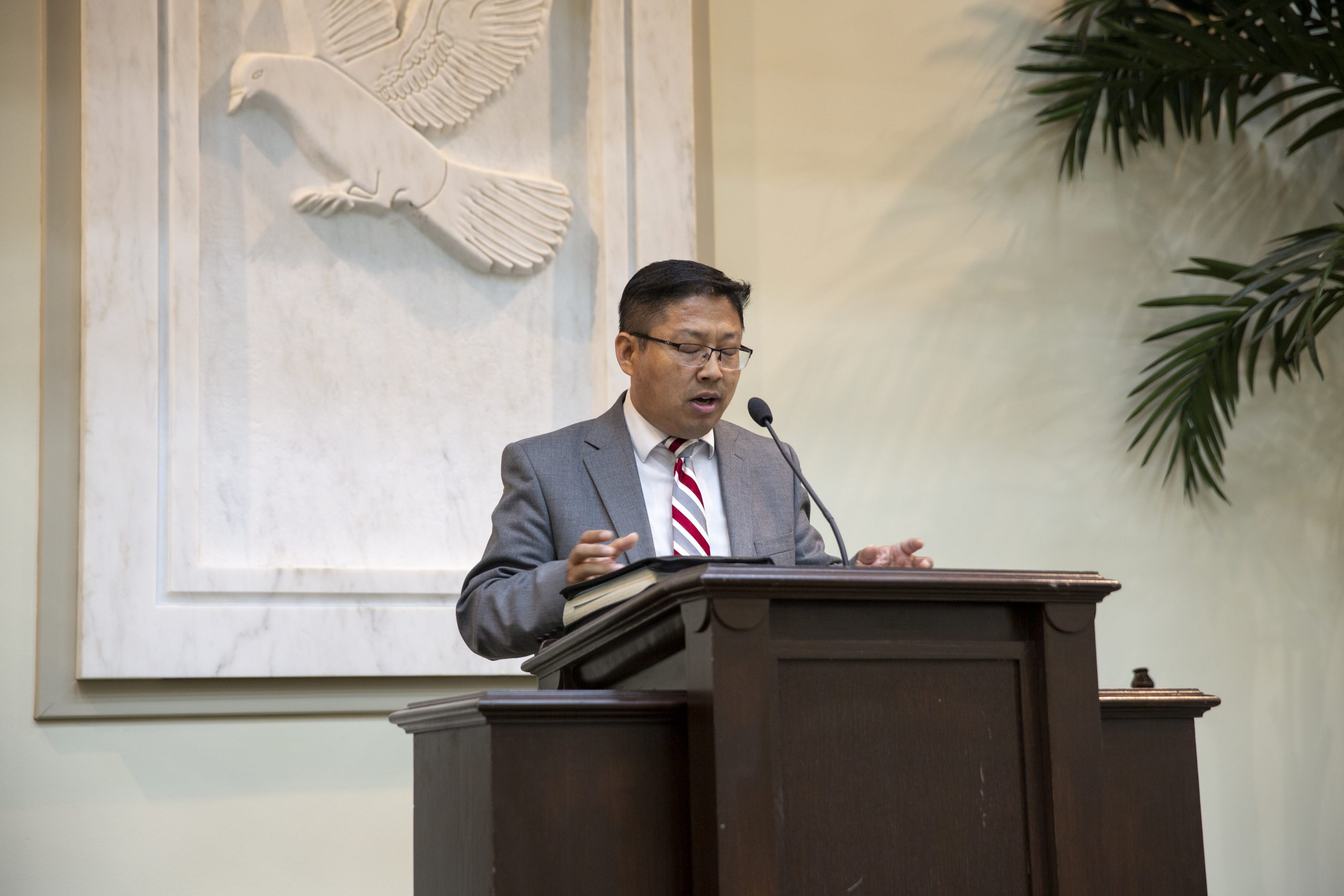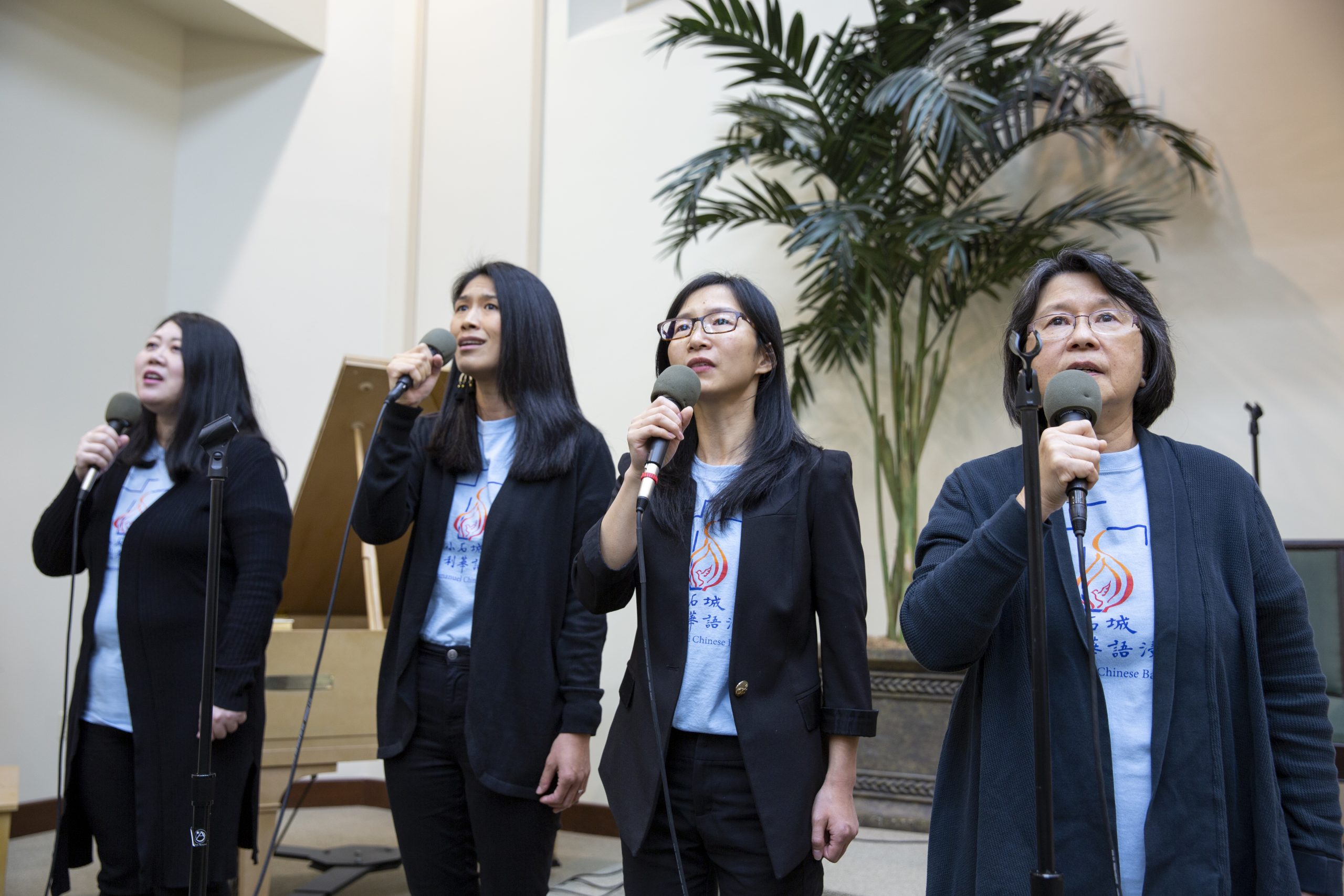亲爱的朋友,欢迎您浏览我们的网站。
“城造在山上,是不能隐藏的”(马太福音5:14下)。我们祈祷,求主使用小石城以马内利华语浸信会,使“这座造在山上的城”能“如日头出现、光辉烈烈”(士师记5:31),在新时代中为主发大光,照亮周围的人,使荣耀归于上帝。
我们诚挚地邀请您来参加我们教会的各项活动!让我们一同认识主,在祂的愛里彼此搀扶,共走天路。以马内利!
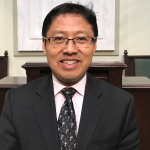 李春海牧师
李春海牧师
最新信息
9/14/25 牧者之言
初谈宋尚节
(接上文)
宋尚节墓园纪念馆
南京是我生活过7年的地方,20年前我从南京神学院毕业离开这座城市。2025年6月6日,我再次来到南京这座历史名城。故地重游,尽管物是人非,“人面不知何处去”,但“桃花依旧笑春风”。这里的一草一木依然如此熟悉亲切,这里喝的水都是甜的。那天晚上,我的同学带我参观南京市中心新街口百货对面的德基广场(Deji Plaza)。这里让我这个久住美国的“乡巴佬”大开眼界,有一种“刘姥姥进大观园”的惊讶与赞叹。广场内的洗手间不叫洗手间,叫“解忧所”。三楼“格序织造坊”的“解忧所”,主题围绕“编织”与时装美学展开。五楼 的“解忧所”前陈设一架“古典钢琴”,通过克莱因蓝与摩登金的色彩碰撞,营造出既优雅又前卫的氛围。八楼推出与艺术家 Beeple 联名的“解忧所”,融入超现实主义艺术风格,是全国首个此类艺术联名盥(guàn)洗空间。八楼的德基艺术博物馆是Beeple全球首展——“来自人造未来的故事”(Tales From a Synthetic Future),它是将现代科技与历史文化融汇的艺术空间,在 Beeple 的作品中,政治人物、卡通形象、电子游戏角色、宗教符号、科技产品一起形成一种“视觉过载”的效果,是典型后现代去中心化、多元并置。置身于人类自己所构建的令人眼花缭乱的后现代文明之中,每个个体显得格外渺小。在泡沫式高度发展或竞争激烈的大都市里,人们面临的精神压力与日俱增,焦虑与抑郁群体的比例呈上升趋势。
在感恩与赞叹祖国经济腾飞的同时,我心灵深处却对亿万同胞灵魂的得救充满忧虑。我不禁要问:人真的能“人定胜天”吗?当人类不断营造自己高大雄伟的“巴别塔”时,若心中没有上帝,那将是何等可怕的光景!正如俄国作家陀思妥耶夫斯基在小说《卡拉马佐夫兄弟》(The Brothers Karamazov, 1880)中所发出的灵魂呐喊:“如果没有上帝,人就可以为所欲为了”(If God does not exist, everything is permitted)。在集体努力所带来的高科技发展光环之下,每一个个体灵魂的归向又在何处?诚如奥古斯丁所言:“神啊,我的心若不归向你,便永远也得不着安息!”
带着受到后现代文明的冲击和拷问,我乘上来南京开往福州的飞机,开始了拜访宋尚节墓园的心灵之旅。快到福州长乐机场了,我心里有一点儿小激动。终于有机会可以亲眼看一看福建这个令我着迷的省份了。我这个出生在东北黑龙江的人,真的可以从南方的福建人身上学到许多宝贵的功课。快下飞机了,我主动和身边的乘客聊了起来。我直接问他说:“你有去教会吗?”他说:“我偶尔去过。”
他问我说:“你来福州干什么?”
我说:“我来参观宋尚节墓园。”
他反问说:“宋尚节是谁?他很有名吗?”
如果我说宋尚节是化学博士,这对宋尚节没有多大意义;如果我说宋尚节是布道家, 这对那个人没有多大意义。
我和他说:“宋尚节是一个真正活出基督的人。他活着时曾影响10多万人信耶稣。他活得很有价值。”接着,我仔细把宋尚节的见证分享给他。临别前,我不忘鼓励他有机会多去教会敬拜上帝。他也礼貌性地答应了。
我曾以为,大多数福建人都已经远赴海外。然而事实却是,大部分福建人依然扎根于故土,在家乡辛勤耕耘,建设着自己美丽的土地。
晚上7点,我在长乐机场与我的学生乔治牧师汇合。他开车载我们一起前往宋尚节的故乡——莆田市的笏石镇(从“笏石镇”到宋尚节出生的福州市福清市新厝镇凤迹村公路距离大约 47-50 公里)。大约晚上9点,我们见到了接待我们的吴传道,他驱车载我们前往莆田市秀屿区笏石镇坑北村的小山上。那晚正值阴历十三,月亮格外圆满明亮。在皎洁的月光下,我们下了车,沿着一道狭窄的台阶乡间小路缓步而行。这一情景让我不由自主地想起耶稣的话:“你们要进窄门;因为引到灭亡,那门是宽的,路是大的,进去的人也多;引导永生,那门是窄的,路是小的,找着的人也少”(太7:13-14)。
眼前就是宋尚节墓园纪念馆了!宋尚节的棺椁就安放这间小房子里了。远远望去,它朴素无华,仿佛与周围的田野融为一体,也与现代都市中高楼林立、灯火辉煌的南京德基广场形成了强烈对比。小房子没有雕饰,没有金碧辉煌的装潢,却透出一种宁静而庄严的氛围,让人不由自主地静下心来,心生敬畏。门前立着一块长牌子:“宋尚节博士归天80周年”,简简单单,却让人感受到岁月沉淀下的深厚敬意。或许,这正体现了神仆人的独特——生前廉洁朴素,去世后依然谦卑而不张扬。站在这里,人们容易想起那条十字架的道路:舍己、谦卑、专注高举基督,而非追求世俗的荣华。此刻,这小小的安放之地若能让人因这份简朴而重新反思信仰的核心,这里便已完成它应有的意义。
纪念室进门有一副对联:“神家瑰宝作柱石,历尽磨难脚踪美”。屋里分上下两层:楼上和地下室。楼上一进屋,印入眼帘的是对面墙上挂着的十字架。宋尚节的生平制作成作一个系列,以10副图画配文字的形式张贴在左右两边的墙上,包括“从出生到赴美留学之前”(1901-1920),“美国留学的七年”(1920-1927)、“回国在福建传道三年”(1927-1930)、“与伯特利布道团合作的三年”(1930-1933)、“神独自引领”(1933-1940)、“离世归主前三年”(1940-1944)。
楼下地下室对面墙上有宋尚节的照片,照片两侧是另一幅对联:“敢于地府摇旌旗,勇向天国写文章”。左右两面墙上分别有两幅很大的画:一副“弃荣报国”画着宋尚节归国时将博士钥匙及相关证书投入大海的一幕。另一幅“东岩异象”画的则是1922年感恩节宋尚节在美留学期间所梦见的异象:
他走在兴化东岩山巅,听见有呼叫声,便连跌带冲、披荆斩棘地下山救人,发现自己浑身鲜血斑斑。小溪顿然变成汪洋,沉溺着各种民族的人,发出凄惨的呼救声。他焦急祷告:‘神啊,我愿奉你的使命,得你的臂助,去救那与恶浪挣扎的千万人。’霎那间,自己变成小孩、罪犯,全身被锁链捆绑!突起血红的十字架自远而近,自高而下,其上写着八个大字‘仰望十架,往前奔跑’。一霎间,锁链不砍而断,那时十字架已漂泊在大海中心,好像一块磁石,吸引着水里的人们,十字架扩充到全部海面,终于不再见到海水,成了一片花香鸟语的乐园……这就是天堂吧……人们在互相拥抱握手,有许多人跑来与他握手,宋尚节发现他们竟然都是中国人,还有许多是兴化的邻居、亲友、同学。
宋尚节的灵柩就安放在这里,置于两层大理石砌成的台座之上。灵柩乳白泛黄的木质表面经过重新打磨,显得格外光洁,并由透明玻璃罩妥善覆盖。令人惊叹的是,这口灵柩曾经在泥土中埋藏长达半个多世纪,直到被重新发掘时,竟依然保存完好——这本身就是神迹。
曾有人总结约翰卫斯理的话说:“给我100个除了罪恶别无所惧,除了上帝别无所慕的人,不管他们是传道人还是平信徒,他们将要震动地狱的大门,并在地上建立天上的国度。”宋尚节岂不就是那位除了罪恶无所惧,除了上帝无所慕的天国战士吗?
在这庄严肃穆之地,我不由得跪在台阶前向上帝祈祷:
“主啊,感谢你在20世纪的中国兴起宋尚节作为献祭者献给主!
主啊,求你赦免我的罪,洁净我的心,使我再次将自己的身心灵献给你!
主啊,求你给我一颗像宋尚节那样爱你的心!
求你在21世纪的今天使更多的人在你的祭坛前,纯粹、圣洁、毫无保留地将自己献上,和你的仆人一同燃烧!”
(未完待续)
9/14/25 Pastor’s Word
An Initial Reflection on John Sung
(continued from the above)
John Sung Memorial and Cemetery
Nanjing is the city where I once lived for seven years, and it has been twenty years since I left this place after graduating from Nanjing Theological Seminary. On June 6, 2025, I once again set foot in this historic city. Returning to familiar ground, though people and circumstances have changed—“the face is gone, but the peach blossoms still smile in the spring breeze”—everything here remains deeply familiar and dear to me. Even the water I drank still seemed sweet. That evening, a classmate took me to visit Deji Plaza, opposite the Xinjiekou Department Store in downtown Nanjing.
For someone like me, who has lived in the United States for many years, Deji Plaza was truly an eye-opener—like Granny Liu stepping into the Grand View Garden. The restrooms inside the plaza were not called “Cesuo”(“washrooms”) but “Jieyousuo” (“Rooms of Solace”). On the third floor, the “Room of Solace” in the “GeXu Weaving Workshop” carried the theme of weaving and fashion aesthetics. On the fifth floor, a classical piano was placed at the entrance of the restroom, with the interplay of Klein blue and modern gold creating an atmosphere that was both elegant and avant-garde. On the eighth floor, in collaboration with the artist Beeple, a “Room of Solace” was presented in a surrealist style, the first such artistic restroom in the country. On the same floor, the Deji Art Museum was hosting Beeple’s first global exhibition, Tales From a Synthetic Future. This museum blends modern technology with historical culture, and in Beeple’s works, political figures, cartoon characters, video game avatars, religious symbols, and technological products collide to create a sense of “visual overload,” a hallmark of postmodernism’s decentralization and plurality.
Standing amidst the dazzling civilization that humanity itself has constructed, the individual feels especially small. In bubble-like rapid development or the intense competition of megacities, people are under increasing psychological pressure, and the proportion of those struggling with anxiety and depression continues to rise.
Even as I give thanks and marvel at my nation’s economic rise, deep in my heart I cannot help but worry for the salvation of millions of souls. I ask myself: Can human beings truly “conquer heaven by their own will”? As humanity builds its lofty “Towers of Babel,” what a terrifying state it would be if there were no God in the human heart! As the Russian writer Fyodor Dostoevsky cried out in The Brothers Karamazov (1880): “If God does not exist, everything is permitted.” Under the dazzling glow of high-tech achievements born of collective effort, where, then, lies the turning of each individual soul? As Augustine once said: “You have made us for yourself, O Lord, and our heart is restless until it rests in you.”
With this shock and questioning from postmodern civilization, I boarded a plane from Nanjing to Fuzhou, beginning my spiritual journey to visit the tomb of John Sung. As the plane neared Fuzhou Changle Airport, I felt a stir of excitement—finally, I would have the opportunity to see with my own eyes the province of Fujian, which had long fascinated me. As a native of Heilongjiang in Northeast China, I knew I could learn many valuable lessons from the people of this southern land. As the plane was about to land, I struck up a conversation with the passenger next to me. I asked directly: “Do you go to church?” He replied, “I’ve been a few times.”
He then asked me, “What brings you to Fuzhou?”
I answered, “I’ve come to visit the tomb of John Sung.”
He asked again, “Who is John Sung? Is he famous?”
I thought to myself: if I said John Sung was a PhD on Chemistry, that would mean little to Sung; if I said John Sung was an evangelist, that would mean little to him.
So, I said, “John Sung was a man who truly lived out Christ. During his lifetime, God used him to lead over one hundred thousand people to faith in Jesus. He lived a life of great worth.” I then carefully shared John Sung’s testimony with him. Before we parted, I encouraged him to attend church more often to worship God. He politely agreed.
I had once assumed that most Fujianese had gone abroad. Yet the truth is, the majority remain rooted in their homeland, diligently cultivating and building their beautiful land.
At 7 p.m., I met my student, Pastor George, at Changle Airport. He drove us to John Sung’s hometown—Hushi Town in Putian City (the road distance from Hushi Town to Fengji Village, Xincuo Town, Fuqing City, Fuzhou, where John Sung was born, is approximately 47-50 kilometers). Around 9 p.m., we met Minister Wu, who welcomed us and drove us to Kengbei Village, Hushi Town, Putian City on a small hill. That night was the 13th day of the lunar calendar, and the moon shone especially round and bright. In the clear moonlight, we stepped out of the car and walked slowly along a narrow country path of stone steps. The scene brought to my mind the words of Jesus: “Enter through the narrow gate. For wide is the gate and broad is the road that leads to destruction, and many enter through it. But small is the gate and narrow the road that leads to life, and only a few find it” (Matt. 7:13–14).
Right ahead is the John Sung Memorial and Cemetery! John Sung’s coffin is placed inside this small building.” From a distance it looked plain and unadorned, blending into the surrounding fields, a stark contrast to the towering skyscrapers and glittering lights of Nanjing’s Deji Plaza. The house had no ornate carvings or lavish decoration, yet it radiated a solemn tranquility that compelled reverence. At the entrance stood a simple plaque: “In Memory of the 80th Anniversary of Dr. John Sung’s Homegoing.” Its simplicity carried a profound sense of honor born of time. Perhaps this was precisely the mark of God’s servant: humble and frugal in life, and still unassuming in death. Standing there, one could not help but think of the way of the cross—self-denial, humility, and the single-minded exaltation of Christ, not the pursuit of worldly glory. If this modest resting place could inspire people to reflect once more on the core of faith, then it has fulfilled its sacred purpose.
At the entrance of the memorial room hung a couplet:
“Treasure of God’s house, a pillar stone;
Through trials and hardships, your footsteps shine.”
The room had two levels: an upstairs hall and a basement. Upstairs, one’s eyes were immediately drawn to a cross hanging on the opposite wall. John Sung’s life was displayed in a series of ten illustrated panels along the side walls: “From Birth to Departure for America (1901–1920),” “Seven Years of Study in the U.S. (1920–1927),” “Three Years of Preaching in Fujian (1927–1930),” “Three Years with the Bethel Evangelistic Band (1930–1933),” “Led by God Alone (1933–1940),” and “The Final Three Years Before Going to Be with the Lord (1940–1944).”
In the basement, a photo of John Sung hung on the wall, flanked by another couplet:
“Dare to raise the banner against hell;
Bravely write the testimony of heaven.”
On the side walls hung two large paintings. One, Renouncing Honor to Serve the Nation, depicted John Sung throwing his doctoral key and related certificates into the ocean upon returning to China. The other, The Vision of Dongyan, portrayed the vision he saw during Thanksgiving in 1922 while studying in America:
He dreamt of walking on the peak of Dongyan Mountain in Xinghua, when he heard cries for help. He rushed down the mountain, stumbling and tearing through thorns, his body covered in blood. A brook turned into a vast ocean, where people of all nations were drowning and crying out in agony. He prayed anxiously: ‘O God, I am willing to receive Your mission and Your power to save the multitudes struggling in the raging waves.’ Suddenly, he himself became a child, a criminal, bound in chains! Then a blood-red cross appeared, drawing near from afar, descending from above, with the words inscribed: ‘Look to the Cross, Run the Race.’ In an instant the chains broke. The cross floated in the midst of the sea like a magnet, attracting the drowning multitudes. The cross expanded until it filled the entire ocean, transforming the waters into a fragrant paradise of flowers and birds. ‘This must be heaven…’ People embraced and shook hands, and many came to grasp his hand. To his amazement, they were Chinese—many were his own neighbors, relatives, and classmates from Xinghua.
John Sung’s coffin rests here, placed upon a two-tier marble platform. Its pale yellow wooden surface has been carefully polished, and it is covered with a transparent glass casing. Astonishingly, though it had been buried underground for more than half a century, when it was unearthed it remained completely intact—this itself is a miracle.
Someone once paraphrased John Wesley’s words: “Give me one hundred men who fear nothing but sin and desire nothing but God, and I care not whether they be clergymen or laymen—they alone will shake the gates of hell and set up the kingdom of heaven upon earth.” Was not John Sung just such a warrior of the kingdom, who feared nothing but sin and desired nothing but God?
In this solemn and sacred place, I could not help but kneel on the steps and pray to God:
“Lord, I thank You for raising up John Sung in twentieth-century China as a living sacrifice unto You!
Lord, forgive my sins, cleanse my heart, and once again I offer my body, soul, and spirit to You!
Lord, grant me a heart that loves You as John Sung did!
And Lord, in this twenty-first century, raise up many more who will, with purity, holiness, and without reserve, offer themselves on Your altar, burning together with Your servant for Your glory!”
(To be continued)
9/7/25 牧者之言
初谈宋尚节
(接上文)确定研究方向
一位好老师可以影响人一生。我的导师马太·麦凯勒博士(Dr. Matthew McKellar)是一位牧者型学者。他将三十多年的牧会经验带到课堂上。[1] 当我在课堂上分享说要研究宋尚节时,他对此给予肯定,并向我介绍说他从前在西南神学院毕业的学生Dr. Philip Koo就曾经研究过宋尚节。在读博士期间,我曾考虑是否要换一个题目,麦凯勒博士则不断鼓励我要集中在这个题目上,不要轻易更换。毫无疑问,麦凯勒博士在这一点上是正确的。
试想,如果我选一个西方布道家或神学家,比如奥古斯丁、司布真、钟马田进行研究,我或许也可以写出合格的论文交给教授,然而这些伟大的基督徒对我的处境有多大的实践意义?我如何在文化层面与他们的思想产生共鸣呢?更深理解这些人的思想对中国教会、海外华人教会及我个人的事奉会带来多少启发呢?宋尚节则不同,他是一位曾留学美国的中国布道家。研究宋尚节是圣灵对我的感动,并且研究这位中国的布道家一定会对我的灵魂产生巨大的冲击和影响,使我可以透过圣灵跨越近一百年的历史长河与这位属灵前辈隔空对话,从而碰撞出真理的火花、圣洁的热情以及教会实践的智慧。
确定博士论文的研究方向从来都不是一件容易的事。如果把整个写作过程比作穿越一片茂密丛林,那么研究方向就好比探险者出发前所选择的小径。方向一旦正确,旅程将更加顺利;若是选择失误,则极易误入歧途,越走越艰难,甚至可能前功尽弃。在这一关键抉择上,麦凯勒博士根据我的兴趣点为我提供了两个思路:其一,探讨宋尚节寓意解经的特点及其当代意义;其二,评估奥利金对宋尚节寓意解经的影响。与此同时,另一位长期研究宋尚节的学者、作家施玮[2]则建议我从“处境化”的角度切入,来理解宋尚节的讲道及它的实践意义。她指出,这样的视角不仅能把握宋尚节整个传道思路的主线,也能更好地厘清其讲道与文化背景之间的互动,并且这个研究方向和成果会祝福教会。感谢上帝的带领,“处境化”这个词如同一把钥匙,为我开启了走向这片学术丛林的路径。
1885年,英国圣公会差会(Church Missionary Society)差派到福建的宣教士爱德温·约书亚·杜克斯(Edwin Joshua Dukes)写道:
“一个人若要像中国人一样思考,就必须自己是中国人;他必须使用中国的比喻、中国的典故和中国的语言,才能使公开演讲真正有效……外国人的嘴巴实在无法说服中国人……中国所需要的不是成千上万的英国人或美国人,而是成千上万、乃至数以万计拥有奉献的口与心的中国人。中国所需要的不是那么多学者,而是有担当的人;若学者的身份附加在这样的人身上,自然是极好的,但最根本需要的是‘人’——勇敢的、真诚的、奉献的、能独立站立的人……现在是寻找中国使徒的时候了。但他的来临迹象尚未显明。当这位使徒来到时,他必是中国人,而不是外国人。他会从神学院出来吗?还是会如同神的使者常常那样,从一些出人意料的地方兴起?我们无法知道;我们只能祈祷他快快来到!并愿他像旷野的施洗约翰一样震动整个民族!”[3]
1901年9月27日,宋尚节诞生于福建省兴化县(今天的莆田),他被誉为“中国的使徒”。他以中国人的文化与方式,向同胞传讲福音、阐释真理。作为早期赴美留学后归国的布道家,他始终流淌着深厚的中华血脉。因此,在属灵的层面上,他与我——一位生于中国、现于美国牧养华人教会的人——产生了遥相呼应的共鸣。圣灵藉此启示我,使我更深体会到:福音并非游离于文化之外,而是能够进入不同处境,被人真实地理解与接受,从而更有力地传递给中国人,乃至普世万民。
(未完待续)
[1]马太·麦凯勒博士是一位优秀神学教授的好榜样,他以基督的生命来服侍学生,真诚关怀每一位学子。他认真对待每一份作业与研究论文。为了帮助学生提升写作水平,他甚至会亲自打电话,一对一地花上一个小时耐心指导。从标题、主旨、大纲,到具体内容,乃至每一个标点符号,他都细致入微地提出宝贵的修改建议。
[2] 施玮著有《献祭者——宋尚节传》(The Sacrifice: John Sung)等书籍。
[3] Edwin Joshua Dukes, Everyday Life in China: on Scenes Along River and Road in Fuh-kien (London: The Religious Tract Society, 1885), 240.
8/31/25 牧者之言
初谈宋尚节
宋尚节(John Sung, 1901–1944)是20世纪上半叶最有影响力的中国布道家,被誉为“中国的布道王”。他的布道对中国教会和海外华人教会产生了深远影响。
第一次听到宋尚节这个名字,是我1998年夏天参加鹤岗市教会举办的义工培训班上。有一位叫贾兰菊的神学生在“讲道法”那门课上提到宋尚节的讲道很有特点,比如:宋尚节会把棺材带到现场,告诉人要及早悔改信耶稣。又比如:当宋尚节讲乃缦得医治(王下第5章)时,他当场从讲台上跳下去、再上来7次,用以表达乃缦到约旦河里沐浴7回。这是我对宋尚节的初步印象:一位讲道方式灵活的传道人。
在南京神学院读书期间,老师和同学偶尔会谈到宋尚节,然而他的形象在我心中若隐若现,并不明晰。 在2003年南京神学院读研究生时,陈泽民副院长(1917年10月15日—2018年10月15日)上课时见证:我小时候在宋尚节布道会上决志信了耶稣。“基督时报”上也记录过这件事:
“一篇报道记载,1931年宋尚节在汕头伯特利教堂举办布道会,此时年仅14岁的陈泽民被深深震撼——‘他的眼睛和视野被扩大了’,他‘开始第一次看到一个中国人,以中国化的方式宣讲福音所能彰显的能量’,这段经历对他的一生产生了重大影响,从此萌生了尽快成为全职传道人的念头”。
陈副院长学识渊博,对神学各家各派的思想也颇为熟悉。尽管他后来的神学路线倾向于自由主义神学,但他对宋尚节却心存敬意。
- 为何研究宋尚节?
43岁这个年龄将宋尚节和我联系起来。宋尚节43岁被主接走;我43岁做了开胸手术,生命得到更新和复兴。
我自幼患有先天性心脏病,15岁时因心衰开始寻求信仰,受圣灵感动,认罪悔改,接受耶稣基督为救主,并将一生奉献给福音事工。主奇妙地保守医治我活了下来。2020年2月13日的开胸手术后,我再次将自己奉献于主。作者是阿尔伯特·本杰明·辛普森(Albert Benjamin Simpson, 1843–1919)所唱:“前要的是祝福,今要主自己,前要的是医治,今要主而已;前我贪求恩赐,今要赐恩者;前我寻求能力,今要全能者”。
术后修养康复期间正值疫情肆虐、闭门不出时,我听到完整的宋尚节见证。 他的见证点燃了我祈祷的火焰和圣洁的热忱。宋尚节27岁在美国获得化学博士学位后,因受主呼召毅然决然地返回中国,并在横渡太平洋、临近中国海岸时,他将象征世上荣耀和身份证明的盒子和金钥匙抛掷到大海,宣告自己彻底向世界死、向基督活。想到这些使我心潮澎湃,巴不得自己也能爱主不顾一切。
宋尚节的布道像使徒保罗那样大有能力。他的布道使一个个灵魂获得救赎,脱离罪恶,甚至经历大神迹、大医治。愿主在二十一世纪想起更多大有能力的工人,在这黑暗的时代唤醒一个个将死的灵魂,使更多人经历救主死里复活的救恩。
宋尚节英年早逝。他在43岁完成主所托付的使命后被主接走。圣灵借着他的死更多唤醒我灵性上的觉醒。主说:“我实实在在地告诉你们,一粒麦子若不落在地里死了,仍旧是一粒;若是死了,就结出许多子粒来”(约12:24)。若不死后不能生。经历心脏大手术死里复生的我,在今后的日子里怎能再苟且偷生、为自己而活呢?
王明道称:宋尚节是中国近代历史上中国教会的“铁柱子”。宋尚节的见证让我流泪。一日在小区作晨祷时,圣灵感动我博士论文要研究宋尚节。我的祈祷是,愿我的研究不仅是知识上的探讨,更是灵性上的进深!愿感动宋尚节的灵加倍地感动更多神所呼召的仆人!
- 宣教学课
2022年秋天,我修一门宣教学课程。Dr. Dean Sieberhagen教授建议我,如果要研究宋尚节,必须要从教会历史的角度先探索宋尚节之前他的老家福建省的传教史。当时我的学期论文题目是:“这人撒种,那人收割:探索宋尚节之前中国福建的新教宣教历史”( “One Sows and Another Reaps”: Exploring the Protestant Missions History in Fujian China before John Sung’s Ministry)。关于这方面的资料很难找。时间短,任务重,在一个半月内写出一篇25页的学术性文章并非易事。我恒切祷告,求主带领。很奇妙,主预备我在网上认识了Dr. Bill Brown教授。我写邮件向他寻求帮助,他第二天就把大量早期去福建的宣教士及相关材料发邮件给我,并在邮件中说:
“我还有两篇关于他(宋尚节)的传记,并且采访过一位中国的年长弟兄和一位姊妹。他们在孩提时代曾参加过宋博士在鼓浪屿的聚会,至今仍清晰记得当时许多人不喜欢他,但他们亲眼看见一位校长的儿子——自出生起就瘸腿——被人推着上台,却当场得了医治,走下台来。整个鼓浪屿为之轰动。我本人是个非常怀疑的人,尤其是在电视上看到那么多的欺骗(保罗的时代也同样如此),但听他们如此生动的分享,真是一个祝福。”
(未完待续)
An Initial Reflection on John Sung
John Sung (1901–1944) was the most influential Chinese evangelist in the first half of the 20th century, hailed as the “Evangelist King of China.” His preaching had a profound impact on the Chinese church and the overseas Chinese church.
The first time I heard the name John Sung was in the summer of 1998, when I attended a Christian volunteer training program held by the church in Hegang City. A seminary student named Jia Lanjü mentioned in the “Preaching” class that John Sung’s preaching had some very unique features. For example, Sung would bring a coffin to the site, telling people to repent and believe in Jesus right away. Another example: when he preached on Naaman’s healing (2 Kings 5), he would actually jump down from the pulpit and climb back up seven times, to demonstrate Naaman dipping himself seven times in the Jordan River. This was my first impression of John Sung: a preacher with a very flexible style of delivering sermons.
During my studies at Nanjing Theological Seminary, teachers and classmates would occasionally talk about John Sung, but his image in my mind was vague and indistinct. In 2003, while I was a graduate student at Nanjing Union Theological Seminary, Vice President Chen Zemin (October 15, 1917 – October 15, 2018) testified in class: “When I was a child, I made a decision for Christ at one of John Sung’s revival meetings.” Christian Times also recorded this event:
“A report noted that in 1931, John Sung held revival meetings at the Bethel Church in Shantou. At that time, 14-year-old Chen Zemin was deeply moved— ‘his eyes and vision were broadened,’ and he ‘for the first time saw how a Chinese person, preaching the gospel in a Chinese way, could display such power.’ This experience had a significant impact on his whole life, and from then on, he developed the desire to quickly become a full-time preacher.”
Vice President Chen was very learned and familiar with the thoughts of different theological traditions. Although his later theological orientation leaned toward liberal theology, he nevertheless held John Sung in high respect.
Why Study John Sung?
The age of 43 connects John Sung and me. John Sung was taken by the Lord at the age of 43; I, at 43, underwent open-heart surgery, through which my life was renewed and revived.
I was born with congenital heart disease, and at the age of 15, because of heart failure, I began to seek faith. Moved by the Holy Spirit, I confessed my sins, repented, accepted Jesus Christ as my Savior, and dedicated my life to the gospel ministry. The Lord wonderfully preserved and healed me so that I survived. After my open-heart surgery on February 13, 2020, once again, I dedicated myself to the Lord. As American pastor and hymn writer Albert Benjamin Simpson (1843-1919) sang:
“Once it was the blessing, now it is the Lord; once it was the feeling, now it is His Word;
once His gift I wanted, now, the Giver own; once I sought for healing, now Himself alone.”
During my post-surgery recovery, which coincided with the COVID-19 pandemic lockdown, I heard the full testimony of John Sung. His testimony ignited in me the fire of prayer and a holy passion. At the age of 27, after earning a Ph.D. in chemistry in the United States, Sung, compelled by the Lord’s call, resolutely returned to China. While crossing the Pacific Ocean and nearing the Chinese coast, he threw into the sea the box and golden key that symbolized worldly glory and his identity credentials, declaring that he had died completely to the world and now lived only to Christ. Thinking of this stirred my heart greatly, making me long to also love the Lord without holding anything back.
John Sung’s preaching was powerful, like that of the Apostle Paul. His messages brought salvation to souls, delivered them from sin, and were accompanied by great signs and healings. May the Lord in the 21st century raise up more mighty workers, awakening dying souls in this dark age, so that more people may experience the salvation of the risen Lord.
John Sung died young. At the age of 43, having completed the mission entrusted to him, he was taken by the Lord. Through his death, the Holy Spirit further awakened me spiritually. The Lord said: “Very truly I tell you, unless a kernel of wheat falls to the ground and dies, it remains only a single seed. But if it dies, it produces many seeds” (John 12:24). Without dying, there can be no life. Having experienced death and resurrection through open-heart surgery, how could I in the days ahead live carelessly for myself again?
Wang Mingdao once called John Sung the “iron pillar” of the modern Chinese church in China’s recent history. John Sung’s testimony moved me to tears. One morning during my neighborhood prayer walk, the Holy Spirit impressed upon me that my doctoral dissertation should focus on John Sung. My prayer is that my research will not only be an academic exploration but also a deepening of my spiritual life! May the Spirit that moved John Sung also move, in double measure, more servants whom God has called!
Mission Class
In the autumn of 2022, I took a course in mission. Professor Dr. Dean Sieberhagen suggested that if I wanted to study John Sung, I must first explore, from the perspective of church history, the history of missions in his home province of Fujian before his ministry. At that time, my term paper was titled: “One Sows and Another Reaps: Exploring the Protestant Missions History in Fujian China before John Sung’s Ministry.” It was very difficult to find materials on this topic. With little time and heavy workload, producing a 25-page academic paper in just one and a half months was not easy. I prayed earnestly, asking the Lord for guidance. Miraculously, the Lord prepared for me to meet Professor Dr. Bill Brown online. I wrote him an email seeking help, and the next day he sent me a large amount of material on early missionaries to Fujian, as well as related resources. In his email he also said:
“I’m glad to hear you are writing about John Sung. I have the very large volume of his diaries, which were thought to be lost. I also have two bios about him, and I interviewed an elderly Chinese brother and sister who attended his meetings on Gulangyu Islet when they were children, and remember vividly how he was disliked by many, but they saw the son of a school principal who had been lame since birth wheeled on stage, and then healed and walk off. The entire island was abuzz. I’m a very skeptical person, after so much fraud on TV (and in Paul’s day as well), but it was a blessing to hear them both share so vividly.”
(to be continued)
8/24/25 牧者之言
回忆赵证耶老牧师
沈师母的见证
一位好的牧者会对人的生命产生巨大影响。在回忆盲人基督徒刘瑞英老人[1]的同时,我又想起了另一位老人,他叫赵证耶牧师。“证”是见证的“证”,“耶”是耶稣的“耶”,他的名字合在一起就是“为耶稣作见证”的意思。他曾经和一位叫李文光的长老(他在中国教会历史上曾有记载)一起服过刑。他们都是那年为了主的缘故,在同一个监狱里服刑。好像是在上个世纪1950年代,我们家乡那边有好多老人都进过监狱,包括我公公沈牧师的父亲,但他是平信徒,只判了一年就回来了。
赵老牧师1914年出生,2006年9月30日被主接走,享年92岁。自从79年4月19日他来到我们家,我接触到他,让他做一个信主的见证。他当时怎么讲的,记得不太清楚了,但大概的情形是这样的:他大约14岁的时候,在长春的街头第一次接触福音。当时有人在街上传福音,场面有点儿像玩儿式的[2],有人弹琴,有人拉手风琴,带着孩子们唱歌。赵牧师自己很喜欢音乐,就被吸引过去了。那时他被苏联恩(曾在金陵协和神学院任教)的爷爷看见了,就亲切地招呼他说:“进来吧!进来吧!”于是他便跟着小孩子们一起参加了聚会。也就是在那时,他开始接受福音,心里被触动,信了主。他家境比较困难。他常常跑去参加聚会、唱诗歌,家里的一些事就顾不上做了。他奶奶对他很不满,不给他饭吃,还拿“烟袋锅子”(东北方言,指的是一种传统的长烟管,用来抽烟,形状像一个小烟袋,通常是木头或竹子做的)拦着他,不让他出去。但他依然偷偷地往外跑,坚持去聚会敬拜主。他的见证感动了我。赵牧师觉得我这个人挺实在的,心直口快。他在我身上下了很大的功夫,对我在信仰上的成长关怀备至。这么多年我们和他及他的家人一直保持着联系。
1979年初,在邓小平历史性访美期间,美国总统吉米·卡特(Jimmy Carter)与这位中国领导人就中国的宗教自由进行了私下交谈。卡特提出了三个具体请求:
- 保障宗教信仰自由:卡特强调,应允许中国公民公开实践自己的信仰。
- 允许圣经发行:他建议中国政府允许在国内印刷和分发圣经。
- 重新开放教会:卡特提议中国重新开放在文化大革命期间关闭的基督教教会。
邓小平回应说:“你的三个问题太难,请允许我今晚考虑一下”。第二天,邓小平则向卡特承诺对前两个请求表示肯定,他说:“我们会在中国重新开放教会”,“我们会在中国印刷圣经”。然而,他拒绝了允许外国传教士进入中国的提议,解释说中国的教会必须由中国自己的领袖来带领,但他欢迎外国人到中国教英文或进行医疗互访等。[3] 改革开放后在新中国印刷的第一批圣经是邓小平亲自用他军委主席的经费支持的[4]。这次交流决定和标志着中国基督教发展的历史性新阶段!这也是多年来上帝对海内外所有弟兄姐妹为中国教会能尽早获得自由坚持不懈祈祷的回应!
赵证耶读过神学。在中国教会开门那年——1979年4月19日,他第一个在我们县里得到通知:《告全国主内弟兄姊妹书》。这个通知是关于允许教会开门的。他带他的女儿、女婿,还有其余的弟兄到我们家送这个通知。从那天开始,教会在我们家恢复聚会了。当时信主的人主要是老年人,也有两位年轻人,一位是张兴牧师,他于82年考入东北神学院,成为那里的第一届学生。另一位是沈牧师,他于81年入南京金陵协和神学院。
我认识的这些老人,只要去我们古城堡,就都会去看望这位刘瑞英老姊妹。如果他们要住下,就把老姊妹带过来,在我们家住,在我们家交通。那个时候,那一代人,在他们身上看到了很多主内弟兄姊妹真正相爱的光景,我觉得我的生命也跟着他们同时成长起来了。
在85年沈牧师南京神学院毕业后,86年我们全家就回沈阳了。我们家在农村的那个房子有三间屋,分东西屋。东屋一直是给教会用,直到87年秋教会盖了房子。他们到政府要一块地盖教堂。我们不知道那个地方。沈牧师有个叔辈哥回老家去看坟去了。他说:“我们家那坟地怎么变成教堂了?”我说:“是吗?我也不知道啊。”当教会向政府申请地方要盖房子,政府就把那个坟地给教会,教会就盖了房子。现在还是那个地方。教会开始先盖了几间平房;后来又盖了瓦房。再后来有位年轻弟兄作教会负责人,现在就盖成很好的彩钢房子了。
盖教堂的时候,家乡那些老人都到我们家来了。他们一起探讨一下、交通一下,我们也都参与了。因为最开始是在我家,大家习惯了。现在也是,有点儿什么事儿,我一回去大家都围着我。我就觉得还像在家里一样。我们农村就是那样儿,你跟她、她跟你都有点儿亲戚关系。福音也好传,一个亲戚信了,就传另一个亲戚。这样,接二连三亲戚们就都信主了。在教会里,亲戚多。等信主了,我们在主里都是弟兄姊妹,就更亲了。
赵牧师每周四到我们家里来弹琴,他女儿教唱诗歌。沈牧师他父亲在解放前、五几年就和赵牧师在一起同工。沈牧师的父亲回天家之前和我说:“你到任何时候都不要离开赵叔,有啥事儿找赵叔商量。”自那以后,我一直就像依靠他家似的。他家女儿现在都八九十岁了。我上个月还回了一趟老家。每次回老家,我都要到这个赵牧师的儿子家坐一坐。有时候赶上吃饭时间,我就在他家吃点儿饭,就像和自己家一样。给我的感觉就是那种“爱”——与世人不同的那种爱。
赵牧师回天家,包括所有老人回天家我都参与了。他走以后,他的儿女没有读神学,但都在教会里,他们家都会弹手风琴。他儿媳是下乡知青,弹琴弹得也特别好。女儿唱得好、弹得也好,都在教会服侍。现在他们年纪都大了,只剩他儿子,77岁了,比沈牧师大一岁。他有时服侍一些小聚会点儿,讲道非常好。虽然没读过神学,可能是他父亲带领的吧,他对圣经非常熟悉。
赵牧师特别有爱心。他从来不批评人。我这个人总是犯错误,性子急,好说话。有时候李文光长老直接批评我:“你不能那么说……。” 李长老性情急,希望我的灵命能快点儿成长,而赵牧师却非常有耐心,他总是和我说:“慢慢来,别着急。”他给我留下了很深的印象。我对圣经里的真理什么都不懂,他就很有耐心地给我讲。我觉得这个老人是值得人敬佩的。
注:当沈师母回忆盲人基督徒赵瑞英老人时,同时也想起这位赵证耶老牧师。沈师母于2025年7月21日以微信的形式讲述了赵牧师的见证。字里行间,我们听出了二十世纪时在中国东北老一代基督徒信仰的真与纯,以及他们对主对人的那份无伪而真诚的爱心。令我们感恩的是,作为在美国的华人教会,我们和这些属灵长辈流淌着同样的属灵血液,我们敬拜同一位圣父、圣子圣灵三位一体的真神。这些长辈是为基督舍己、作监、谦卑、以生命传递生命,走十字架道路的见证人。他们的故事如同云彩一样围绕着我们,激励后辈效法先贤谦卑随主,使我们在21世纪的今天继续靠主砥砺前行,为主作出更多更新更美的见证。
(李春海)
[1] 沈师母的见证,“盲人姊妹刘瑞英”,https://lricbc.org/?p=1680,浏览于2025年8月18日。
[1]“场面有点儿像玩儿式的”这句话听起来简单,但背后却隐藏着很深的传福音或宣教理念,那就是以人们容易接受的、较为灵活的方式把主的福音自然地分享出去,如保罗所说:“我们传扬他,是用诸般的智慧,劝戒各人,教导各人,要把各人在基督里完完全全地引到神面前。”(西 1:28)
[1]此段关于卡特总统与邓小平主席的交流请参Michelle A. Vu, “Transcript of Jimmy Carter’s Opening Speech for the China Bible Ministry Exhibition in Atlanta,” Christian Post Reporter, Friday, June 09, 2006, https://www.christianpost.com/news/transcript-of-jimmy-carter-s-opening-speech-for-the-china-bible-ministry-exhibition-in-atlanta.html?utm_source=chatgpt.com,浏览于2025年8月18日。
[1]我(李春海)曾听我的老师Dr. Faye Pearson 亲口讲过这件事。她曾担任美南浸信会海外宣教部驻亚洲区的总干事。参https://www.imb.org/2019/02/21/faye-pearson/,浏览于2025年8月18日。她说,当时她曾受到卡特总统的接见,并听总统亲口讲到这件事。参李春海:“缅怀一位特别的母亲裴斐老师”,https://lricbc.org/?p=1023,浏览于2025年8月18日。
In Honor of Memorizing Pastor Zhao Zhengye
Testimony by Mrs. Shen, the Pastor’s Wife
A good pastor can have a tremendous impact on a person’s life. While recalling the blind Christian elder Sister Liu Ruiying,[1] I was also reminded of another elder—Pastor Zhao Zhengye. His name carries deep meaning: “Zheng” means testimony, and “Ye” stands for Jesus—together, “a testimony for Jesus.” He once served time in prison together with Elder Li Wenguang (who is mentioned in the history of the church in China). Both of them were imprisoned in the 1950s for the sake of the Lord, in the same prison. Many elders from my hometown, including my father-in-law, were also imprisoned during those years. My father-in-law was a lay believer, sentenced only to one year before being released.
Pastor Zhao was born in 1914 and was called home by the Lord on September 30, 2006, at the age of 92. On April 19, 1979, he came to our home, and that was when I first had close contact with him and asked him to share his testimony of faith. I cannot remember his words in full, but the outline was this: when he was about 14 years old, he first encountered the gospel on the streets of Changchun. At that time, some people were preaching in the streets in a lively manner [2] —playing musical instruments, with accordions, and singing hymns with children. Zhao, who loved music, was drawn to it. He was noticed by a grandfather of Su Lian’en (who later taught at Nanjing Union Theological Seminary), who warmly invited him: “Come in, come in!” So, Zhao joined the children’s gathering. It was then that he was touched by the gospel and came to believe in the Lord.
Zhao’s family was poor, and his devotion to worship often led him to neglect household chores. His grandmother, unhappy with him, sometimes denied him food and even blocked the door with a smoking pipe (a traditional Northeastern Chinese long-stemmed pipe that some ladies would use to smoke) to keep him from leaving the house. Yet he still found ways to sneak out to attend worship. His testimony deeply moved me. Pastor Zhao himself thought I was an honest, straightforward person, and he invested much effort in guiding me and caring for my growth in faith. For many years, we kept close contact with him and his family.
In early 1979, during Deng Xiaoping’s historic visit to the United States, President Jimmy Carter privately discussed with him the matter of religious freedom in China. Carter made three requests:
- Guarantee freedom of religious belief, allowing citizens to openly practice their faith.
- Permit the printing and distribution of the Bible.
- Reopen churches that had been closed during the Cultural Revolution.
Deng replied: “Your three requests are very difficult. Allow me to think it over tonight.” The next day, he promised Carter that he would agree to the first two: “We will reopen churches in China, and we will print Bibles in China.” But he declined the third—allowing foreign missionaries back into China—explaining that the Chinese church must be led by its own people. However, he welcomed foreigners to come teach English or engage in medical exchanges.[3] The very first batch of Bibles printed in post–Cultural Revolution China was directly supported by Deng Xiaoping, who allocated funds from his Military Commission budget.[4] This exchange marked a historic turning point in the development of Christianity in China, and was a clear answer to the persistent prayers of countless believers, both within China and abroad, who had long sought freedom for the church.
Pastor Zhao had studied theology. On April 19, 1979—the very day churches were officially allowed to reopen—he was the first in our county to receive the notice titled “A Letter to All Brothers and Sisters in the Lord Nationwide.” He came to our home with his daughter, son-in-law, and several other believers to share the news. From that day, worship gatherings resumed at our home. At first, most of the believers were elderly, though two young men joined as well: Pastor Zhang Xing, who in 1982 enrolled in Northeast Theological Seminary as one of its very first students, and Pastor Shen, who entered Nanjing Union Theological Seminary in 1981.
The elders I knew would often go to our hometown Guchengpu to visit Sister Liu Ruiying. If they stayed overnight, they would bring her to our house, where we would fellowship together. That generation of believers displayed genuine love for one another in Christ, and through their example, my own spiritual life grew as well.
After Pastor Shen graduated from Nanjing Seminary in 1985, our family returned to Shenyang in 1986. Our rural home had three rooms; the east room was always set aside for church gatherings until the autumn of 1987, when a new church building was constructed. Pastor Shen’s brother from his uncle disclosed that the government granted land for it, which, interestingly enough, turned out to be the burial cemetery of our family. When the church first applied for land, the authorities allocated that very plot. Today, the church still stands there—at first simple houses, later tiled rooms, and now, under the leadership of a younger brother, a well-built chapel with steel roofing.
When the church was being built, the elders would always gather at our home first for discussion and prayer. Because worship had begun in our home, everyone naturally continued to meet there. Even now, when I return to my hometown, people gather around me as if we were still family. In our rural setting, everyone is related in some way, which made evangelism easier—one relative believing, then another, and so on. The church became a family of both kinship and spiritual fellowship.
Pastor Zhao used to come to our home every Thursday to play piano, while his daughter taught us hymns. My father-in-law had worked with Pastor Zhao before the 1950s, and before he passed away, he told me: “Never leave Uncle Zhao. Always seek his counsel.” Since then, I leaned on Pastor Zhao’s family as though it were my own. Even now, I visit his son’s home whenever I return. Sometimes I stay for meals—it feels just like being at home. That sense of love—different from the world’s kind of love—is what I always experienced in their family.
When Pastor Zhao went home to the Lord, I attended his funeral, as I did for many of the elders. Though his children did not go to seminary, they all served faithfully in the church. His children could all play the accordion, his daughters were gifted in music, and his daughter-in-law, a former “sent-down youth”- relocated to a rural village during China’s Cultural Revolution, where she worked in agriculture and learned from the local peasants, played especially well. His son, now 77 years old, still serves at small gathering points, preaching with great familiarity with Scripture, even though he never had formal theological training.
Pastor Zhao was filled with love. He never criticized people. I, on the other hand, often made mistakes, quick-tempered and outspoken. Elder Li Wenguang would sometimes rebuke me directly: “You cannot say that!”—hoping I would grow more quickly in faith. But Pastor Zhao was patient, always saying: “Take it slowly, don’t rush.” He left a deep impression on me. Even when I knew nothing of biblical truth, he gently and patiently taught me. He was truly a man worthy of respect.
Note: While recalling the blind Christian Sister Liu Ruiying, Madam Shen also remembered Pastor Zhao Zhengye. She shared this testimony on July 21, 2025, via WeChat. Between the lines, we can hear the authenticity and purity of faith in the older generation of Christians in Northeast China during the 20th century—their sincere love for the Lord and for others. We give thanks that, as Chinese Christians overseas, we share the same spiritual bloodline as these elders of faith. We worship the same Triune God: Father, Son, and Holy Spirit. These elders bore witness to Christ through self-denial, imprisonment, humility, and the passing on of life through life as they walked the way of the cross. Their stories are like a great cloud of witnesses surrounding us, encouraging us to follow in their steps of humility and discipleship, so that in the 21st century we too may continue pressing forward in Christ, bearing ever new and more beautiful testimonies to His glory. (Chunhai Li)
__________________________________________
1. “Sister Liu Ruiying – The Blind Prayer Warrior,” Testimony by Mrs. Shen, the Pastor’s Wife, https://lricbc.org/?p=1680, access August 18, 2025.
2. “In a lively manner.” This description may sound simple, but behind it lies a profound principle of evangelism and mission: sharing the gospel of the Lord in a natural and flexible way that people can easily accept. As Paul said: “We proclaim him, admonishing and teaching everyone with all wisdom, so that we may present everyone fully mature in Christ” (Colossians 1:28).
3.This section regarding President Jimmy Carter’s exchange with Chairman Deng Xiaoping is referenced in: Michelle A. Vu, “Transcript of Jimmy Carter’s Opening Speech for the China Bible Ministry Exhibition in Atlanta,” Christian Post Reporter, Friday, June 9, 2006, https://www.christianpost.com/news/transcript-of-jimmy-carter-s-opening-speech-for-the-china-bible-ministry-exhibition-in-atlanta.html?utm_source=chatgpt.com, access August 18, 2025.
4. I (Chunhai Li) personally heard this account from my teacher, Dr. Faye Pearson. She once served as the Executive Director for the Asia Region of the International Mission Board of the Southern Baptist Convention. See: https://www.imb.org/2019/02/21/faye-pearson/
, accessed August 18, 2025. She said that at the time she had been hosted by President Jimmy Carter and personally heard him recount this event. See: Chunhai Li, “Remembering a Special Mother: Dr. Faye Pearson”, https://lricbc.org/?p=1023, access August 18, 2025.
历史归档
- December 2025 (1)
- November 2025 (5)
- October 2025 (4)
- September 2025 (4)
- August 2025 (4)
- July 2025 (4)
- June 2025 (4)
- May 2025 (5)
- April 2025 (5)
- March 2025 (5)
- February 2025 (4)
- January 2025 (4)
- December 2024 (5)
- November 2024 (5)
- October 2024 (4)
- September 2024 (4)
- August 2024 (5)
- July 2024 (4)
- June 2024 (5)
- May 2024 (4)
- April 2024 (4)
- March 2024 (7)
- February 2024 (5)
- January 2024 (4)
- December 2023 (8)
- November 2023 (10)
- October 2023 (6)
- September 2023 (4)
- August 2023 (5)
- July 2023 (6)
- June 2023 (6)
- May 2023 (4)
- April 2023 (13)
- March 2023 (4)
- February 2023 (4)
- January 2023 (7)
- December 2022 (14)
- November 2022 (4)
- October 2022 (2)
- September 2022 (8)
- August 2022 (5)
- July 2022 (6)
- June 2022 (7)
- May 2022 (5)
- April 2022 (12)
- March 2022 (6)
- February 2022 (5)
- January 2022 (8)
- December 2021 (8)
- November 2021 (4)
- October 2021 (3)
- January 2019 (1)
